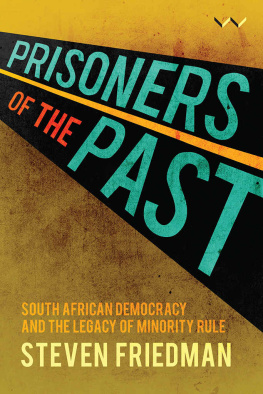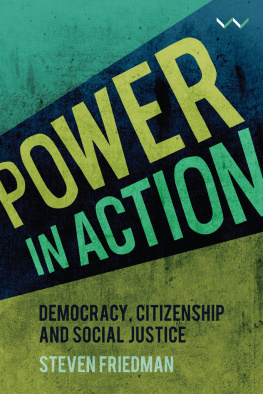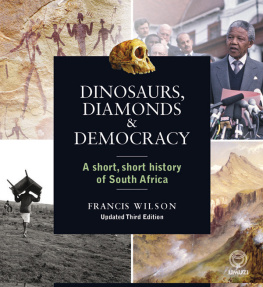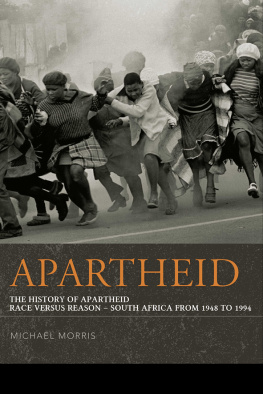

Published in South Africa by:
Wits University Press
1 Jan Smuts Avenue
Johannesburg 2001
www.witspress.co.za
Copyright Steven Friedman 2021
Published edition Wits University Press 2021
First published 2021
http://dx.doi.org.10.18772/12021066840
978-1-77614-684-0 (Paperback)
978-1-77614-685-7 (Hardback)
978-1-77614-686-4 (Web PDF)
978-1-77614-687-1 (EPUB)
All rights reserved. No part of this publication may be reproduced, stored in a retrieval system, or transmitted in any form or by any means, electronic, mechanical, photocopying, recording or otherwise, without the written permission of the publisher, except in accordance with the provisions of the Copyright Act, Act 98 of 1978.
Project manager: Lisa Compton
Copyeditor: Lisa Compton
Proofreader: Simone van der Merwe
Indexer: Margie Ramsay
Cover design: Hybrid Creative
The past is never dead. Its not even past.
WILLIAM FAULKNER, Requiem for a Nun
CONTENTS
I n one of those polarised arguments which are typical of South African political debate, a quarter-century of democracy has either changed everything or nothing. Both views are right and both wrong.
This claim is made not to appear cute. It reflects an important reality which the debate largely ignores: that a society can both change and remain the same. This book argues that this is precisely what has happened in South Africa since formal democracy was achieved in 1994. It aims to show that, while much has changed, the society still operates in ways which share strong features with realities before all adults were allowed to vote and all citizens were able to enjoy, at least in principle, the freedoms which are central to democratic citizenship.
The view that nothing has changed might sound good in speeches but does not bear serious scrutiny. It should be trite to point out that, under apartheid, most South Africans could not live or move where they pleased. Or that most people were denied, because of their race, the opportunity to study where they wished or to occupy the jobs best suited to their talents and inclinations. Some of these restrictions were eased as the apartheid state tried to reform in order to survive, but not all were. When formal democracy began in 1994, black South Africans still laboured under severe restrictions. Today, none of them apply. South Africans are far freer today than before apartheid ended.
Nor is there substance to the claim that the first 25 years of democracy have brought no social and economic changes. This period witnessed a strong growth in a black professional and business class which was only beginning to emerge when democracy dawned. in response to a citizens campaign for adequate treatment whose success would not have been possible without the rights extended by democracy and the opportunities it creates to pressure politicians to respond to public demands.
But much has remained the same. Poverty and inequality persist, a product of the continued division of the population into economic insiders who enjoy access to the benefits of the formal economy and outsiders who do not. Black students rebel against this, demanding the decolonisation of higher learning.
How to explain this apparent contradiction between change and continuity? Perhaps the most common approach among those who agree that society has changed since 1994 is to see the transition from racial minority rule as an unfinished journey: the society has made progress but much work remains. Yet the patterns of the past persist not because the current path of change is still getting around to tackling them. They survive because that path is incapable of dealing with them. The changes since 1994 may be real, but they are also all that is possible within the current development path because it does not fundamentally alter how the economy and society operate.
To put this another way: In 1994, the new democracy inherited a society of insiders and outsiders. The insiders were all white and the outsiders all black (even if some, in the former Bantustans, had a stake in the system which made them outsiders). Since 1994, a significant number of outsiders have become insiders: the black South Africans who are now able to occupy positions and play roles which apartheid reserved for whites. But the rest remain outsiders in the economy and society, although not in the political system. So South Africans can now vote and enjoy freedoms denied to most by minority rule anyone who thinks this is trivial has forgotten or never knew the humiliations of apartheid. Some have also been able to use these freedoms to claim a better life and more dignified treatment. But many are condemned by the current path to remain economic and social outsiders. They will not become insiders if the elites who decide the societys fate simply try harder to do what they have been doing since 1994. The outsiders will win inclusion only if the elite and the society set out on a new path. To illustrate, think of South Africa in 1994 as a country whose economy and society were controlled by an exclusive club, composed of only white people. Since 1994, the club has taken on new, black members. But it remains an exclusive club because many cannot gain admission and most of the new members lack the same powers and privileges enjoyed by the old ones.
This path was chosen not, as we are sometimes told, because the political leadership who negotiated the settlement which produced democracy were slaves of the white establishment. It was selected because the new political elite agreed with the old economic and social power holders on one crucial point: that the goal of the new democracy was to ensure that what whites enjoyed under apartheid would be available to all. That being so, there is no need to change the way in which things have been done for decades in the economy and social institutions; all that is needed is to ensure that everyone can do them. It is the key reason why the core pre-1994 patterns remain. Neither elite saw any need to change them.
It needs no pointing out why the old elite wanted to retain that to which it was accustomed. The old insiders have an obvious stake in protecting past patterns. The new elite saw it the same way because, in its view, to deny everyone what whites enjoyed was to expect the black majority to settle for second best. During the negotiations, an African National Congress (ANC) official who was later to become a Cabinet minister argued that sections of the white establishment were arguing for privatisation because they did not want black politicians to get [their] grubby paws on the state-owned companies the old elite had used to advance its interests. Similarly, it could be argued that large corporations should not be broken up because black people would not benefit from controlling them. Or that curbing the lifestyles of the affluent would deprive black people of the way of living which only whites once enjoyed. Instead of insisting that the economic and social habits of the minority were wasteful and a bar to progress, the new governing elite insisted that the minoritys lifestyle should be available to all. Since it is impossible to extend to everyone what a minority enjoyed because it used force to deny opportunities to the vast majority, this inevitably meant that some would enjoy the fruits of this choice but most would not.
This may explain why the negotiation process which ended apartheid did not tackle these issues. The compromise of 1993 settled only one question the denial of citizenship and rights to the vast majority. This issue was crucial and no progress on any others was possible without addressing it. But it was not the only their impact was limited. The bargained compromises which produced a new constitution extending equal rights to all were not accompanied by similar agreements on how the economy and social institutions (schools, colleges and universities, for example) should change to dissolve the exclusive club. And so core patterns remain unchanged. The unspoken consensus between the two elites was to leave things largely as they were, not because the new political elite feared a backlash if it sought to change them, but because it wanted to leave them intact.
Next page







